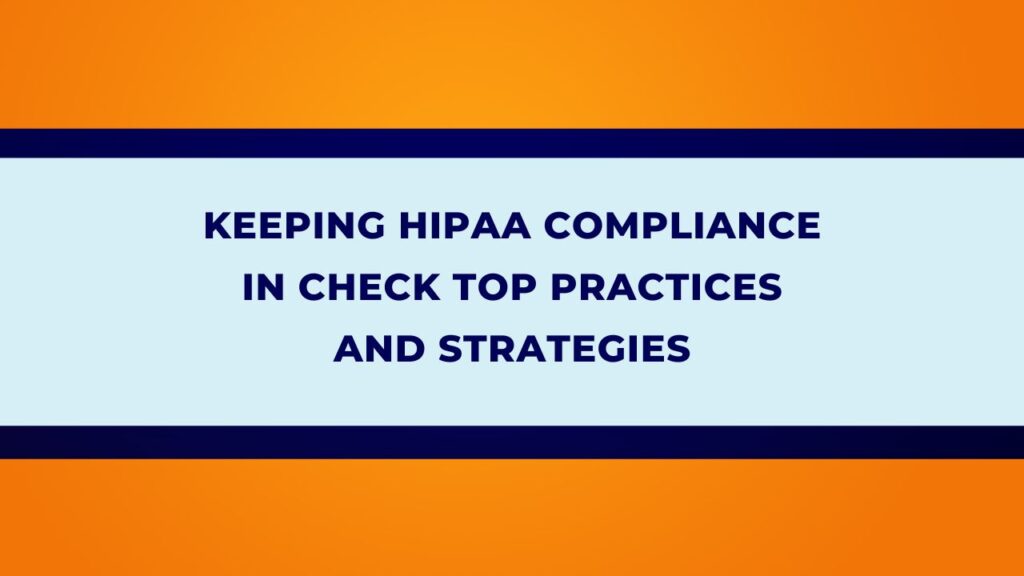In today’s healthcare, doctors use technology to give good care and meet patient expectations. But, using advanced tech can make healthcare systems vulnerable to cyber attacks. That’s why laws like HIPAA exist to protect health information. Those covered by HIPAA must keep health info safe. This article talks about keeping HIPAA compliance and what’s crucial for patient info safety.
HIPAA Compliance Requirements: Simplified Overview
To follow HIPAA compliance, start by understanding its key rules. Covered entities need to follow the Privacy, Security, and Breach Notification Rules. These rules explain the security steps to keep patient information safe.
Here are the key requirements:
Business Associate Agreements (BAAs):
- When working with others, like vendors, a signed BAA is needed before sharing any health records.
- The BAA is like a contract to keep health info private. It should include an annual review of changes.
Employee Training
Ensuring HIPAA awareness is crucial for healthcare industry staff in businesses and organizations. Every employee should undergo HIPAA training to grasp the significance of protecting PHI. Every Medical billing company should conduct Annual staff training and also ensure they stay informed about any changes or updates in their organization’s HIPAA compliance policies and procedures.
Annual Audits and Risk Assessments:
- Every year, covered entities must check if their security measures meet the rules.
- Audits look at administrative, technical, and physical safeguards.
- Remediation and Incident Response Plans:
- After audits, healthcare providers fix any issues.
- They also make a plan for when there’s a data breach.
Creating a Program
To keep your patients’ information safe, it’s crucial to set up a good compliance program. This program should cover training, monitoring, and auditing.
Here’s what a good compliance plan should include:
Risk Assessment Questionnaire
- Third-party vendors need to fill out risk assessment questionnaires. This helps find possible weaknesses in your security. It’s a good way to see if your partners understand HIPAA rules. Analyzing risks also tells you if your vendors have enough security to protect patient info from harm.
Proper Documentation and Protocols
- Keep the right paperwork and follow certain rules after a data breach. Make sure everyone knows how to stick to HIPAA standards. Train your staff on these standards and have penalties for those who don’t follow them.
Assets and Devices
- HIPAA has rules about storing and sending electronic patient info. A good HIPAA program should have a list of devices with patient info. Use strong codes when sharing data online, like in emails or faxes.
Physical Site
- The ways you keep patient info safe online should match how you secure things on-site. Check your places to find and fix weak spots. This includes checking facility access and keeping work areas secure with things like double locks and alarms. Remember, a strong HIPAA compliance plan is vital to keeping patient information safe and following the rules.
HIPAA Compliance Training and Education
Covered entity staff can ensure HIPAA compliance by using strong security measures and participating in compliance training. HIPAA training not only teaches healthcare workers about essential data protection steps but also provides guidance on the best methods to achieve and uphold compliance.
Security and Privacy Measures
To comply with HIPAA regulations, both covered entities and business associates must follow specific security and privacy measures. The Privacy Rule allows individuals to get a copy of their health information (PHI), and the Security Rule establishes standards for maintaining the confidentiality, integrity, and availability of PHI.
Organizations need to take action by putting in place safeguards and appointing a HIPAA security officer to identify, monitor, and handle potential risks. Additional steps involve setting up user access controls, creating contingency plans, and using risk assessment tools.
Conclusion
Sticking to HIPAA rules lets healthcare places work better without risking patients. Even though it’s tough to keep following HIPAA, there are ways to make it easier.
Some services can check if you’re doing HIPAA right. Places like the Compliancy Group can give you a HIPAA certification too.
All of these steps make following HIPAA simpler. You won’t need to start everything from the beginning. This way, you can also save time and money. And, you can make your HIPAA efforts fit what your place needs.
FAQs
What are steps towards HIPAA Compliance?
Start by appointing a HIPAA officer.
- Choose someone responsible for privacy and security.
Make sure all employees get HIPAA training.
- Ensure everyone understands the rules.
Create and enforce HIPAA policies.
- Have clear rules and make sure they’re followed.
- Understand how well you’re following the rules now.
Regularly update and improve your HIPAA practices.
- Keep getting better at protecting privacy and security.
How to Follow HIPAA Rules?
Secure Your Data:
- Keep your information safe to follow HIPAA rules.
- Use firewalls, passwords, and encryption.
- Make sure your data is protected.
Backup Plans:
- Prepare for problems like breaches or power outages.
- Have backup procedures in place.

